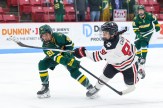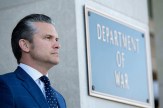The rugged path to engineering leadership
For one day last month, 20 students in the Gordon Engineering Leadership Program at Northeastern University called Camp Edwards, a military base on Cape Cod, their classroom. They climbed ropes, scaled walls and shimmied across narrow planks suspended above water.
Cadets in Reserve Officer Training Corps programs at colleges and universities in New England guided the Gordon students through a series of timed obstacle courses designed to improve their confidence and leadership skills in high-pressure situations.
The Gordon program enables students to earn a master of science in an engineering discipline of their choice, such as mechanical engineering, energy systems or engineering management, and a graduate certificate in engineering leadership. Bernard and Sophia Gordon established the program with a $20 million gift from the Gordon Foundation.
Students, known as Gordon Fellow candidates, usually enter the intensive one-year program via an employer sponsorship.
Team-building exercises outside the classroom embody Northeastern’s commitment to experiential learning and help students get to know each other better, learn from each other and build camaraderie, said Steve Klosterman, professor and industry relations director of the Gordon Engineering Leadership Program.
He said the same strategies apply whether students are figuring out the best way to carry a 50-pound box across a pool of water or designing the specifications for a lamp.
“They have to describe a situation, formulate a plan, explain the plan to their teammates and figure out how to execute the task successfully,” he said, noting the importance of critical thinking and problem-solving skills.
Participating in the field leadership course taught Gordon Fellow Ben Pinkus several valuable lessons for managing a team, whether he’s leading his classmates or his work colleagues. Pinkus is a systems engineer for Raytheon.
“You want to be able to pick a position where you can view the entire problem,” said Pinkus, who “dove right in and tested the waters” as team leader for a particularly challenging course that his group could not complete. “It’s important to delegate to your teammates and be in a position to see the end goal.”
The Gordon Fellows thought of some of the most innovative solutions to their physical challenges, said Elizabeth McNamara, a 21-year-old Army cadet lieutenant colonel at Providence College, where she commands the Patriot Battalion.
“They came up with ideas that I’ve never seen before,” she said. “They were intelligent and approached the challenges in a rational manner.”





